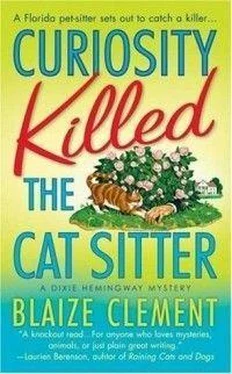Guidry and I still hadn’t spoken. It was as if we had a tacit agreement that we would do this thing without conversation. He led the way to the autopsy room and opened the door for me to go in first. There was a small square waiting room with scuffed beige linoleum floor and a few plastic molded chairs. A battered wooden coffee table heaped with dog-eared magazines with torn-off rectangles where addresses used to be, and a TV monitor mounted on the wall like in a hospital room. A half wall separated an attendant in green surgical scrubs from the waiting room. He stood on his side with his fists pushed against the counter and stared suspiciously at us. On the wall behind him, a filing cabinet held a coffeepot and some mugs and a jar of Cremora, but he didn’t seem inclined to offer refreshments.
Guidry gave his name, and the young man picked up a phone and spoke briefly. In a few seconds, the inner door opened and a tall Cuban-American woman came out carrying a manila envelope. She had warm almond eyes and white hair cropped tight against her skull.
She and Guidry shook hands, and Guidry said, “Dr. Corazon, this is Dixie Hemingway.”
We shook hands, and if she thought it strange that Guidry had brought along somebody in rumpled shorts and a T, she didn’t show it.
Fifteen
Dr. Corazon pushed a pair of reading glasses to the top of her head. “Your man had a subdural hematoma that would have resulted in his death, but he probably died of a laryngeal spasm. Officially, he drowned.”
Guidry frowned. “I don’t understand.”
“If a person dies within forty-eight hours of being immersed in water, it’s officially called drowning. Fifteen percent of drowning victims don’t have water in their lungs, but die of hypoxia caused by a laryngeal spasm. In other words, they choke to death. Mr. Frazier had enough water in his lungs to kill him, but he also had a laryngeal spasm. It’s impossible to say which killed him, but the hematoma would have caused his death if he hadn’t had a laryngeal spasm or taken water into his lungs.”
Guidry said, “I guess it doesn’t matter. Whether it was the blow to the head or drowning or choking to death, it was still homicide.”
“Well, that’s the problem, Lieutenant. It does matter. The blow to his head was inflicted by a blunt object moving in a right-to-left trajectory. The tape applied to his head to keep his nose and mouth underwater was done left to right.”
Guidry and I both stared openmouthed at her. I found my voice first. “You mean he was killed by two people?”
“I mean he was first struck in the back of the head by a right-handed person, and then taped to the cat’s water bowl with his nose and mouth underwater by a left-handed person.”
Guidry said, “Maybe it was one ambidextrous person.”
“That’s possible too.”
“Any idea what hit him?”
“Blunt instrument, Lieutenant. You know what that means.”
We all knew. A blunt instrument can be just about anything.
“Here’s another thing,” said Dr. Corozon. “He was nude when he was struck, and there was a time lag before somebody dressed him and tried to drown him. I know that because there was dried blood on his body, under his clothes.”
I said, “If they let him lie around long enough for blood to dry on his body, maybe he was already dead when they stuck his nose in the cat bowl.”
She shook her head. “No, he had some water in his lungs. He was still breathing when somebody taped him down in the water, but he wasn’t fully conscious. I know that because there are no petechiae, little broken blood vessels from struggling to breathe.”
Guidry said, “Can you give me a time of death?”
“This isn’t TV, Lieutenant. He died between the time he was last seen alive and the time he was found dead.”
He grinned. “Can’t you narrow it down a bit more?”
“From the lividity, best estimate is around two A.M.”
“Any idea how much time elapsed between the time he was hit and when he died?”
“Several hours, probably.”
Guidry thanked the ME and took the manila envelope from her. She said, “Good luck, Lieutenant. Nice meeting you, Ms. Hemingway.”
We smiled at each other and she bustled off to her grisly inner sanctum. Guidry held the door open for me, and I went through like an obedient puppy. We retraced our way through that peculiar combined odor of chemicals and putrefaction and body wastes that permeates every hospital, both of us with our heads down to keep from breathing deeply, both of us thinking hard. I suppose Guidry was thinking about his case, but I was thinking how strange it was that I had stopped trembling the minute the medical examiner had come out to talk to us, when it was the ME I had been dreading so much. The last time I’d spoken to an ME, it had been to get the details of the autopsies on Todd and Christy, but somehow that memory hadn’t surfaced while Dr. Corozon had spoken. Instead, I had snapped into cool, objective detachment.
We went through the exit and stepped into the heat of the parking lot. I said, “I looked through the house before I found the body. I didn’t see any blood spatters.”
Guidry said, “He was probably taking a shower when he got hit. Forensics found blood traces in the bathtub drain.”
“Somebody had cleaned the tub?”
“Yeah.”
We trudged across the hot pavement to Guidry’s car, and he beeped it unlocked. We slid into its stifling heat and he started the engine and turned the air conditioning up high. I looked at my watch. We had been inside the hospital only fifteen minutes.
I said, “When I stopped by to pick up her house key, Marilee said she was just about to take a shower.”
He turned his head and gave me a look. “You think that’s significant?”
“Not unless she was about to take a shower with Harrison Frazier.”
“Do you have any reason to think she was?”
“Come on, Lieutenant, they were bound to know each other. Harrison Frazier wasn’t the kind of man to go around breaking in a woman’s house.”
“Not unless he was accustomed to using a key and she’d had the locks changed.”
Right then and there, I should have confessed that I had read Marilee’s letter to her daughter. I should have told him that Shuga Reasnor knew things she hadn’t told. But Marilee was a kind woman who gave her grandmother bread makers and expensive apartments, and she deserved a chance to have a relationship with a daughter she’d given up when she was fifteen without it becoming public knowledge. Besides, Shuga Reasnor was right. If Marilee was okay, she would be pissed sixteen ways from Thursday if she came home and found her most intimate secrets blabbed to the world.
For all those irrational reasons, I kept quiet.
Guidry said, “Do you happen to know whether she’s right-handed?”
I shut my eyes and replayed her arm stretching toward me with the door key dangling from her fingers. “She handed me the new key with her left hand.”
He nodded and didn’t say anything else. I didn’t, either.
At the entrance to the parking lot at the Sea Breeze, Guidry stopped to let a woman on a yellow three-wheeler cross in front of us. Red-faced under hair dyed an improbable shade of magenta, she was leaning over the handlebars and pedaling with grim therapeutic exertion. A pole jutted at an angle from the rear of the trike, with a triangular orange alert flag attached to its end like a waving tail. We watched her move down the sidewalk the way jungle animals might watch a lioness chasing prey.
We pulled into the parking lot, and I pointed silently to the spot where my Bronco was parked. When Guidry stopped behind it, I said, “So when can I bring Ghost home?”
Читать дальше












